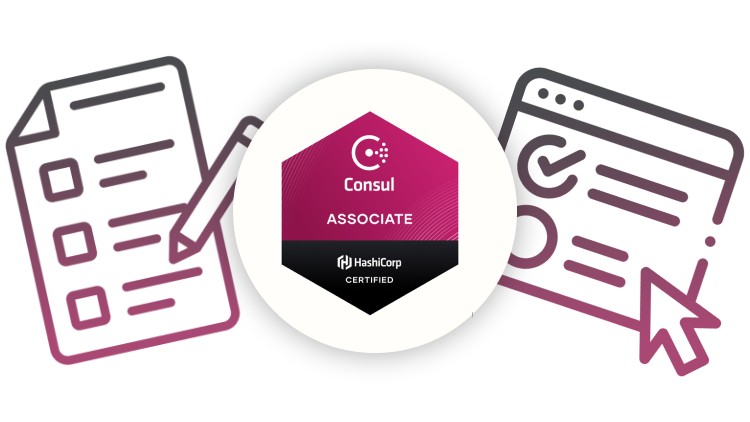
Prepare the HashiCorp Certified Consul Associate. 120 unique high-quality test questions with explanations!
What you will learn
Master Consul’s Core Concepts
Effectively Implement and Manage Consul
Understand Consul’s Consistency Models and Use Cases
Prepare for the HashiCorp Consul Associate Certification Exam
Why take this course?
Welcome to the Ultimate Practice Test for HashiCorp Certified: Consul Associate!
Prepare to master the Consul Associate exam with our expertly crafted mock exams, designed to provide 120 unique, high-quality multiple-choice questions that will ensure you are well-prepared for the certification. Whether you’re looking to brush up on key concepts, sharpen your technical skills, or assess your readiness for the exam, this course has you covered. Our questions are original and carefully constructed to mimic real exam scenarios—each paired with detailed explanations to enhance your understanding and fill any knowledge gaps.
- Question Bank: 120 original questions covering all core domains of the Consul Associate certification.
- Retake Unlimited Times: Retake the exams as many times as you’d like to perfect your knowledge and skills.
- Expert Support: Got questions? Our certified instructors are here to help guide you through any challenges.
- Mobile-Friendly: Study on the go! Access the course on the Udemy app to learn from anywhere at any time.
- 30-Day Money-Back Guarantee: Not satisfied? We offer a full refund within 30 days, no questions asked.
Sample Question:
Question:
Which of the following is the default consistency model of Consul?
- A) Strong Consistency
Explanation: Strong consistency ensures that all replicas of the data will return the same result after any modification, but it is not the default model in Consul. - B) Eventual Consistency
Explanation: Eventual consistency is a consistency model where updates propagate slowly across the system. While this is used in many distributed systems, it’s not the default in Consul for most operations. - C) Hybrid Consistency
Explanation: Consul uses a hybrid consistency model that provides eventual consistency for reads but strong consistency for operations like leader election or service registration. - D) Causal Consistency
Explanation: Causal consistency maintains order of operations based on cause and effect, which isn’t Consul’s primary consistency model. - E) Quorum Consistency
Explanation: Quorum consistency involves consensus from a majority of nodes, which is part of Consul’s Raft-based consensus but not the default for all operations. - Correct Answer: C) Hybrid Consistency
Overall Explanation: Consul employs a hybrid consistency model. This allows for different consistency guarantees depending on the operation. For example, service catalog reads can be eventually consistent, while operations like leader election require stronger consistency, using a Raft-based consensus algorithm.
This course covers the key domains of the Consul Associate exam, including:
- Introduction to Consul Architecture
- Service Discovery and Health Checking
- Consul KV and ACLs
- Multi-Datacenter Configuration
- Deployment and Operations
Each question is meticulously designed to target these core areas, helping you practice for real-world scenarios that you will face during the exam. Each correct and incorrect answer is accompanied by a detailed explanation to reinforce learning.
We are confident that with this practice exam, you will walk into the Consul Associate certification exam fully prepared and confident.
Enroll now and take the next step in your cloud journey!